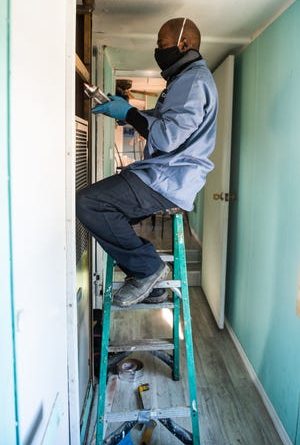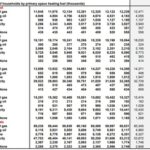Winter heating costs on the rise. What to do if you cannot afford to heat your home. – Times Herald-Record
Energy Disrupter
Local leaders are worried the number of Mid-Hudson residents having trouble heating their homes will skyrocket this winter as the pandemic socks the economy and heating costs remain high.
So, county officials and local poverty experts are touting various resources including the Home Energy Assistance Program known as HEAP – government aid to help low-income locals cover heating costs.
Compared with last year, they think the local recipient totals for HEAP, which helps nearly 100,000 Hudson Valley residents, could rise sharply during the pandemic.
Altogether, in 2019 benefits for HEAP, a state-funded, county-administered program, helped 34,738 in Westchester County, 16,275 in Orange County, 14,574 in Rockland County, 12,063 in Ulster County, 11,901 in Dutchess County, 6,256 in Sullivan County and 1,543 in Putnam County, according to the state.

A single individual can earn up to $2,610 per month to be eligible for full HEAP benefits, two- and three-person households can respectively earn up to $3,413 and $4,216, while a family of four can’t exceed $5,019 to get the most available funds.
Other factors also may be considered for eligibility, including the primary heating source and the presence of a household member who is younger than age 6, who is age 60 or older or permanently disabled, according to the state website detailing HEAP benefits, https://otda.ny.gov/programs/heap/
How to get help
Local leaders are reminding people this winter to check with their heating companies and utility providers, including Central Hudson, Orange & Rockland and NYSEG, for help paying energy bills. Plus, an online application process is available for the state’s Heating and Cooling Assistance Program or HEAP via https://mybenefits.ny.gov/mybenefits/begin
Recent research on the local economy’s health and the estimated costs of heating homes this winter are fueling regional leaders and experts’ reasons for concern.
Increases projected for most fuel costs
To heat homes this winter, compared with last year, the federal government projects respective increases of 6% for natural gas (to $572), 7% for electricity (to $1,209) and 18 percent for propane (to $249), with heating oil’s total winter cost expected to fall 10% to a still-pricey $1,221.
“This winter, for those without resources, it’s going to be heartbreaking” to pay bills and heat homes, said Jonathan Drapkin, president and CEO of Hudson Valley Pattern for Progress, a regional research institute that studies societal inequities. “You can see the hardship that has occurred in the images of cars in line to get food (at food banks). We’ve not seen that for decades.”

Charlie Quinn, an Orange County advocate for low-income households and CEO of the Regional Economic Community Action Program in Middletown, also says he’s “very worried.”
Besides connecting area residents with HEAP benefits, his organization, better known as RECAP, weatherizes apartments and homes for those struggling financially.
RECAP also administers an Orange County fund that offers grants to households that earn slightly too much for HEAP.
“A lot of people in our nation don’t have the bootstraps to pull themselves up by,” Quinn said.
The state’s latest labor market figures support Quinn’s concerns. The Orange-Rockland-Westchester metro statistical area’s non-farm private sector employment tally fell 8.6% in October, the most recent available month, to 893,200, down 83,600 jobs from last year.
That job total dropped 6.4%, over the same span, in Sullivan County to 27,800, while the Kingston metro area is off 4.7% (to 60,800) and the Dutchess County metro area’s job count has slipped 8.7% to 137,800 positions.
Unemployment across the Hudson Valley, meanwhile, nearly doubled to 6.5% in September from 3.6% in September 2019, the latest state figures show. Data on the lopsided nature of the economy’s recovery offers more cause for concern.

Time-limited moratoriums
Nearly one in six New York residents (14.3%) are currently unemployed, or under-employed (meaning they can’t get enough hours to fully make ends meet), or they’ve stopped looking out of frustration they can’t readily find an adequate job, according to the federal government’s third-quarter “U-6” unemployment tallies.
For those earning over $60,000, the economy and job market have largely bounced back to pre-pandemic levels, according to a recent study from Opportunity Insights, a Harvard-based research institute.
Those earning about $30,000 to $60,000 also are faring radically better these days, with just under a 5% unemployment rate.
But for the lowest income earners, those bringing in $27,000 or less, almost one in five (19.2%) can’t find gainful employment, the study found.
At the same time, two financial time bombs are ticking for those struggling in New York, said John Liddle, Sullivan County’s family services commissioner, who oversees the county’s HEAP program.

In June, Gov. Andrew Cuomo signed legislation backing a moratorium preventing utility companies from disconnecting services to residential households that are struggling with their bills due to the COVID-19 pandemic.
He’s also championed an eviction moratorium for renters during the pandemic. But the evictions moratorium expires on Jan. 1 and the utility-related shut-off protections end on March 31.
“Even though there are eviction and utility shut-off moratoriums based on people experiencing a COVID hardship, people can’t just stop paying their bills” entirely or forever, Liddle said. “What scares us in social services is people are just kind of letting these things go.”
Local leaders ready to help
To survive this winter, Liddle said his advice to those struggling in Sullivan County is “‘even if you can’t pay your full bill, especially in the case of rent, pay something.’”
Still, making ends meet during the pandemic won’t be easy, especially if bad weather increases heating costs, said a trio of Orange County leaders.
Among them were Terri Torchio, the county’s director of economic independence, Debbie Hendrien, the county’s HEAP supervisor and Irene Kurlander, the social services department’s deputy commissioner.
“We are really anticipating a sharp upturn of people needing to apply for all benefits, not just in HEAP but in homeless benefits and in temporary assistance” or welfare payments, Torchio said.
Orange County leaders are encouraging Mid-Hudson residents to use energy assistance programs to help them come in from the cold, stressing there’s no shame in asking for help.
Plus, local residents should check with their heating companies and utility providers, including Central Hudson, Orange & Rockland and NYSEG. Most have some form of assistance program to help those struggling to heat their homes.
“Sometimes, a sense of pride keeps people from making those applications” for help, Kurlander said. But there’s no shame in asking for assistance “when it’s become so difficult to cover expenses, with food and fuel costs so challenging” in the pandemic.
daxelrod@th-record.com
Original Source: https://www.recordonline.com/story/news/2020/11/23/local-leaders-fear-many-cant-afford-heating-homes-during-pandemic/3775034001/














